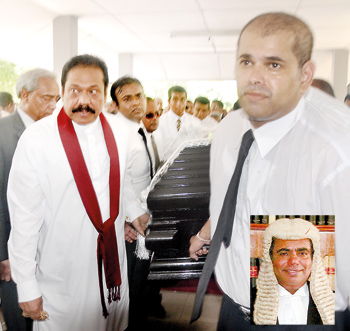News
C.R. de Silva: Learnt of books and men; learnt to play the game
View(s):The funeral of one of the leading criminal lawyers in the country, a popular public figure Chitta Ranjan de Silva was held yesterday at the Colombo General Cemetery amidst a vast gathering of colleagues, friends and students of his old school, Royal College.
C.R. de Silva was a President’s Counsel, a former Attorney General and Chairman of the Lessons Learnt and Reconciliation Commission (LLRC). To most he was known by his nickname “Bulla” and he would be known not so much for the numerous public posts he held with great esteem and aplomb, but for a job he refused to accept — the job of the Chief Justice.

President Rajapaksa carrying the coffin of his close friend C.R.De Silva yesterday. (Inset: C.R.De Silva) Pic by Ranjith Perera
Late last year and early this year, when the government decided to impeach the then sitting Chief Justice Shirani Bandaranayake, President Mahinda Rajapaksa was looking for someone who would replace her. Aware that the government’s move was an unpopular one, at least with a majority of the Bar Association, the President turned to his close personal friend C.R. de Silva, PC. He knew his close personal friend and one-time Attorney General who was having a thriving criminal practice by then would be the ideal candidate to smoothen ruffled feathers.
The late C.R. de Silva may not have been the first lawyer to have refused such an offer, but he must be the only one who was visited at his private residence, unannounced, by the Head of State and offered the plum job in the judiciary; which he politely declined.
He must have good reason to do so, and told his old friend, but he never went public with it. His friendship with the President never stood in the way of doing his duty by the nation and his conscience. He would say, in private that “he will always help a friend”, but he said he would never yield to political pressure. That was evident in his conduct as Chairman of the LLRC which ironically handed its their much acclaimed report exactly two years ago to the President.
Pundits, especially from overseas, pre-judged the Commission’s work and maligned it saying the Chairman was the President’s friend. On seeing the report they would have had to eat their words, as the world-at-large, even the bitterest critics of the Sri Lankan government accepted its findings and pushed for the implementation.
C.R. de Silva would have been a tinge disappointed at the slow pace at which the wide-ranging recommendations were implemented, but he had done the government, and the nation a massive service by at least pre-empting an international war crimes tribunal at its door-step, a demand that has not entirely waned due to the government’s prevarications.
At Royal, the burly C.R. de Silva was a prop-forward and captained the rugby football team in 1968. Royal beat traditional rivals Trinity and S. Thomas’ to win the Bradby Shield and Michael Gunaratne Trophy. He was the automatic choice to captain the Combined Schools XV that year. He continued his rugby at Law College from where he passed out and joined the Attorney General’s Department in 1976 as a state counsel.
He rose to be the Solicitor General and headed the Criminal Division, which included cases of the CID for ten years, and later became the Attorney General in April, 2007.
In his many years as a state prosecutor he appeared in several high-profile cases and as a senior law officer of the state he appeared in international forums, especially the UN Human Rights Council in Geneva defending the Government. He negotiated several bi-lateral air agreements for the country and had a well known spat with Justice Bhagawathi, when a UN Human Rights Committee the former Chief Justice of India headed sat to probe the slaying of 17 aid workers of a French NGO in Sri Lanka and challenged the integrity of the Sri Lankan Commissioners also inquiring into the same matter.
C.R. de Silva was tipped to be appointed Chief Justice soon after his retirement as Attorney General in 2009, but he went into private practice where he was warmly welcomed by those in the private Bar. He would often say that his ideal of a perfect judge was his own father, the late Justice K.D. de Silva and felt that he didn’t have the ‘judicial temperament’ to be a judge, leave alone a Chief Justice. And yet, by the time his name was in the running in 2009, he may have felt he was ready for the job.
The job was never given to him and the President may have come to rue the fact by 2012. C.R. de Silva meanwhile was a much sought after criminal lawyer with a lucrative practice and he engaged in many philanthropic activities and social service programmes, the last being as head of a Cattle Foundation overseeing the wellbeing of cattle that had been released from slaughter houses on court orders.
He would say that he derived greater personal satisfaction financing people to regain their sight or get cured of a disease than, for instance, going on a cruise.
C.R. de Silva was a lecturer at the Sir John Kotelawela defence Academy and at Law College and involved himself in the activities of his alma mater where he was chairman of its rugby advisory committee and sports council. He was made a Vice President of the Royal College Union, the old boys association two years ago.
He was 65 at the time of his untimely death having led a distinguished and multifaceted life.


